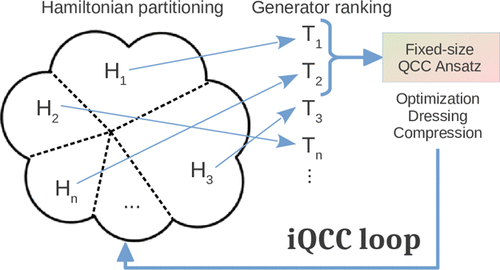当前位置:
X-MOL 学术
›
J. Chem. Theory Comput.
›
论文详情
Our official English website, www.x-mol.net, welcomes your
feedback! (Note: you will need to create a separate account there.)
Iterative Qubit Coupled Cluster Approach with Efficient Screening of Generators.
Journal of Chemical Theory and Computation ( IF 5.7 ) Pub Date : 2020-01-24 , DOI: 10.1021/acs.jctc.9b01084 Ilya G Ryabinkin 1 , Robert A Lang 2, 3 , Scott N Genin 1 , Artur F Izmaylov 2, 3
Journal of Chemical Theory and Computation ( IF 5.7 ) Pub Date : 2020-01-24 , DOI: 10.1021/acs.jctc.9b01084 Ilya G Ryabinkin 1 , Robert A Lang 2, 3 , Scott N Genin 1 , Artur F Izmaylov 2, 3
Affiliation

|
An iterative version of the qubit coupled cluster (QCC) method [I. G. Ryabinkin et al., J. Chem. Theory Comput. 2019, 14, 6317] is proposed. The new method seeks to find ground electronic energies of molecules on noisy intermediate-scale quantum devices. Each iteration involves a canonical transformation of the Hamiltonian and employs constant-size quantum circuits at the expense of increasing the Hamiltonian size. We numerically studied the convergence of the method on ground-state calculations for LiH, H2O, and N2 molecules and found that the exact ground-state energies can be systematically approached only if the generators of the QCC ansatz are sampled from a specific set of operators. We report an algorithm for constructing this set that scales linearly with the size of the Hamiltonian.
中文翻译:

具有有效筛选生成器的迭代Qubit耦合聚类方法。
量子位耦合簇(QCC)方法的迭代版本[IG Ryabinkin等,化学学报,2010年,理论计算。提议[2019,14,6317]。新方法试图在嘈杂的中型量子装置上找到分子的地面电子能量。每次迭代都涉及哈密顿量的规范变换,并采用恒定大小的量子电路,但以增加哈密顿量为代价。我们对LiH,H2O和N2分子的基态计算方法进行了数值研究,发现只有从一组特定的算子中采样QCC ansatz的生成器,才能系统地获得确切的基态能量。我们报告了一种构建此集合的算法,该算法随哈密顿量的大小线性缩放。
更新日期:2020-01-26
中文翻译:

具有有效筛选生成器的迭代Qubit耦合聚类方法。
量子位耦合簇(QCC)方法的迭代版本[IG Ryabinkin等,化学学报,2010年,理论计算。提议[2019,14,6317]。新方法试图在嘈杂的中型量子装置上找到分子的地面电子能量。每次迭代都涉及哈密顿量的规范变换,并采用恒定大小的量子电路,但以增加哈密顿量为代价。我们对LiH,H2O和N2分子的基态计算方法进行了数值研究,发现只有从一组特定的算子中采样QCC ansatz的生成器,才能系统地获得确切的基态能量。我们报告了一种构建此集合的算法,该算法随哈密顿量的大小线性缩放。











































 京公网安备 11010802027423号
京公网安备 11010802027423号